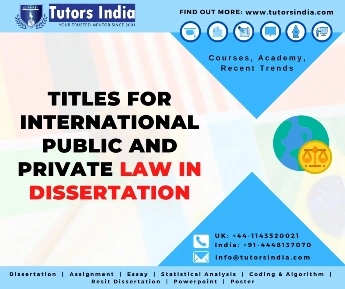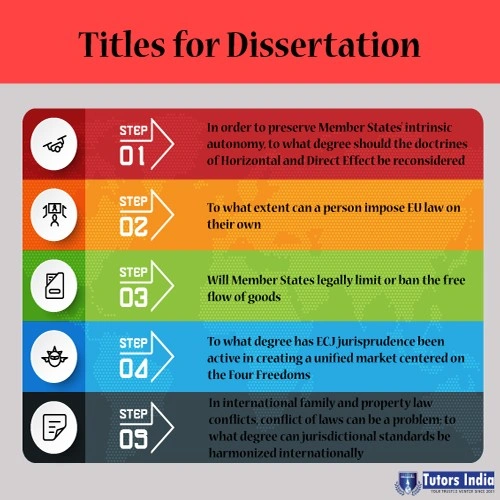Titles for International Public and Private Law in Dissertation
International law encompasses a wide range of topics, including the law of armed conflict, self-determination, and human rights. Essentially, the field is concerned with a collection of laws, norms, and standards that are universally accepted by countries.

Public International Law
Public law, which is similar to constitutional law, effectively guarantees that the public-state relationship is controlled so that the government does not abuse its powers or manipulate people. The foundations of the UK constitution, Parliamentary Sovereignty, transparency, and judicial review are all included in this field of law.
We’ve compiled a list of dissertation subjects and proposals on international public and private law for you to consider. You are free to use these ideas as inspiration for your own law dissertation topics.

Titles for Dissertation
1. In order to preserve Member States’ intrinsic autonomy, to what degree should the doctrines of Horizontal and Direct Effect be reconsidered?
The conflict between EU law’s dominance and member states’ sovereignty will be explored in this dissertation subject. As a result, it will track the evolution of ECJ case law from Costa v ENEL (Case 6/64) RCR 585 to Van Gend en Loos (Case 26/62) [1963] ECR 1 and Amministrazione delle Finanze dello Stato v Simmenthal (Case 106/77) [1989] ILRM 53 and beyond. It will then conduct a case law analysis to assess the impact of the dispute on the legislative structures of Ireland and the United Kingdom, and decide if the ECJ’s decision should be reconsidered.
2. To what extent can a person impose EU law on their own?
The citizens’ rights to enforce EU law, which varies in applicability, will be the subject of this dissertation issue. As a result, the forces of Article 267 and the van Colson (Case -14/83) will be considered in this review. The Francovich (Case C-48 9/90) damages privileges would then be examined. Shoppenstadt’s Formula (Brasserie de Pecheur C-46; Headley Lomas C-5/94) provides for this in Article 340(2). It will then consider the impact of the Pupino Case (Case C-105/03, Criminal Proceedings Against Maria Pupino) on the application of EU law against private persons. Finally, it will look at the right of standing to apply for judicial review directly to the ECJ under Article 263 TFEU. As a result, this examination will include a thorough examination of the citizen’s right to enforce EU law and determine if change is needed.
3. Will Member States legally limit or ban the free flow of goods?
Quantitative constraints and all equivalent measures on the free flow of goods are prohibited under Article 34 TFEU (Article 28 EC) and Article 35 TFEU (Article 29 EC). Articles 34 and 35 are, however, eligible by Article 36 TFEU (Article 30), which makes exceptions for reasons of public concern, such as public health, national security, or morality. As a result, the Member State must either demonstrate that a possible limitation has no inhibitory effect or that it comes under Article 36 TFEU. Geddo v Ente Nationale Risi [1973] ECR 865 identifies the approach taken under Article 34 as a rigid interpretation with little leeway. The issue is that there has been debate on how the proposal should be made; as a result, this article will focus on the decision in C-110/05 Commission v Italy [2009] 2 CMLR 34 and other recent cases involving the application of restrictions.
4. To what degree has ECJ jurisprudence been active in creating a unified market centered on the Four Freedoms?
This dissertation topic will look at the four freedoms, as well as the case law surrounding each one, to see if a single market has emerged. It will mainly include a case law analysis in which the ECJ’s approaches to each freedom will be compared. It will also consider whether the market has resulted in the creation of a social union.
5. In international family and property law conflicts, conflict of laws can be a problem; to what degree can jurisdictional standards be harmonized internationally?
The treatment of relatives, divorce, and will conflicts under international conflict of laws rules will be the focus of this dissertation subject. As a consequence, depending on the essence of the property and/or conflict, different laws can be applicable to the same situation. This raises the question of whether a general harmonization of jurisdictional rules is needed in this field (if possible).
Conclusion
International law, in principle, allows states to have more stable, reliable, and organized relations. However, as can be seen, these rules and standards often clash, making international law an arena that is continually changing to meet the demands and challenges of the modern world.
Tutors India offers International Public and Private Law in Dissertation. Trusted Academic Writing & Editing Services guaranteed by the best in the Industry
References
- Kozien, A. (2021). Contemporary challenges of cultural heritage management by public and private entities. Economic and Social Development: Book of Proceedings, 144-154.
- Cosandey, F. (2021). What is the boundary between public and private? Some reflections, based on the royal domain. L’Atelier du Centre de recherches historiques. Revue électronique du CRH, (22 bis).
- De Chazournes, L. B. (2021). Fresh water in international law. Oxford University Press.
- Torremans, P. (2021). Intellectual property and the EU rules on private international law: match or mismatch?. In EU Copyright Law. Edward Elgar Publishing.

 Previous Post
Previous Post Next Post
Next Post